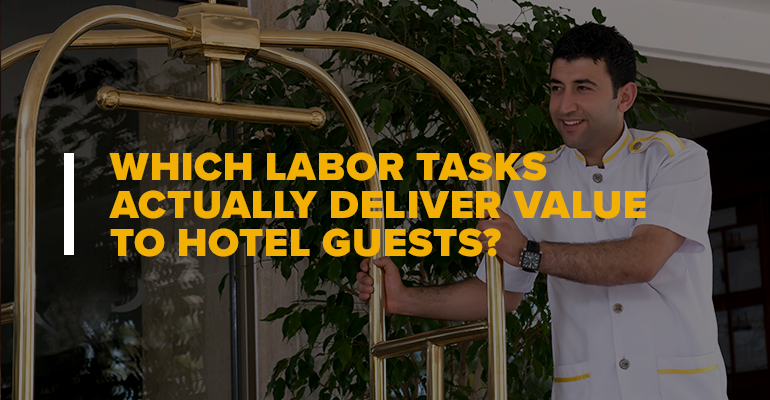Yesterday’s guest expectations aren’t necessarily today’s or tomorrow’s. While expectations are a critical variable in the value equation, most hoteliers already know they’re fluid and continuously evolving. To maximize perceived value in a guest’s eyes, hotel operators must be keenly aware of the specific services that guests want today, not last year or even last week.
That’s why it’s crucial for hoteliers to understand which of their many labor tasks actually deliver value to their guests and, conversely, which are mostly a waste of time. Given our unique perspective on every facet of hotel operations across all property classes, we wanted to shed light on which labor tasks deliver perceived value to your guests and, therefore, are worthy of your attention and efforts.
Old Isn’t Always New Again
Hoteliers strive to stay on top of amenity and technology trends. Over the last 20 years, internet access and lots of accessible electrical outlets have become items guests expect. Televisions are flat screens on the wall, and guests carry their phones in their pockets. Many higher-end properties now have tablets that allow the guest to make a request, order a meal, and control things in their room. However, when we look at staffing roles in hospitality, the trend to change has been at a much slower pace.
I was in an old and distinguished hotel in London a few years ago that featured a short staircase of seven steps to get from the front door to the front desk. After the doorman greeted you, he motioned toward the steps about 10 feet directly ahead. At the foot of the steps was a sign that said: “Ascend the steps to the Front Desk.” In addition to the sign was a person, who cheerfully told me to please go up those stairs to get to the front desk. At the top of the stairs, I was about three feet away from the corner of the desk. Standing in that spot was another person whose duty was to tell me I had arrived at the front desk, and someone would check me in presently.
Contrast the above with a hotel in New York City where when you arrive in the lobby, you’re greeted by kiosks, similar to the way most people check in at airports. One guest service agent is present to help those who need it, but the bulk of the people checking in simply walk up to an open kiosk and tap the screen to go through the process.
Caring, attentive people are part of what makes staying in a hotel a special experience at any price point.
The contrast between the two examples highlights how and when a well-trained staff enhances the service experience. Many hoteliers have, in recent years, reduced staff in positions like Bell or even Concierge. While Concierge service is an expectation at higher-end brands, many guests now use the internet to achieve what a concierge once did with a telephone and some well-placed connections. Also, when your luggage has wheels on it, you’re less likely to need someone to roll it the last few hundred feet to your room. Caring, attentive people are part of what makes staying in a hotel a special experience at any price point.
Some may feel that the New York hotel went too far in reducing the human experience, while many may agree that posting a person at the top and bottom of seven stairs to tell you what you can clearly see is unnecessary. The modern guest places a higher value on expediency at check-in and check-out. They want attentive staff who can answer questions, too, but they don’t want their time wasted. So, where’s the balance? As countless examples tell us, customers and guests will always gravitate toward enterprises that give them the most perceived value, leaving everyone else racing for second place.
Lesson Learned
These days, some hotels have consolidated the PBX functions instead of having guests call different departments to make a request. Some have reduced or even eliminated room service. Many hotels have substantially reduced bell staff, having picked up on a lesson airlines have learned, catering to the modern traveler that usually wants to spend as little time in the airport as possible, preferring to carry on bags rather than sit in front of a luggage carousel after a long flight.
While most hoteliers understand the lesson so well-represented by bell staff, others continue to needlessly chase after value that isn’t there anymore. In the example of the London hotel, the two people staffing the lobby stairs were a labor expense that could be better utilized elsewhere, symbolic of other labor tasks common to many hotel operations that simply don’t hold perceived value from a guest’s perspective in today’s market. The other frequently heard complaint from hoteliers is that “quality staff are hard to find,” thus more (presumably lower quality) staff are needed to perform the same tasks.
Within the context of workforce optimization, tasks with little or no perceived value create inefficiencies in operations that ultimately impact guest satisfaction and the intent to return. If you’re not devoting your attention and resources to labor tasks that your guests actually value, they’ll ultimately find a hotel that will. If a significant portion of your staff struggles to do the right things to take care of your guests, hiring more people like that doesn’t balance that equation, it just means you have even more people providing mediocre service and diminishing your value proposition with your guests. Once a hotelier is ready, willing, and able to prioritize their many labor tasks according to their value rather than tradition or habit, the next step is to identify those with the greatest value and allocate staffing and training efforts accordingly.
Prioritize Your Labor Tasks
Start that task-identification process by gaining a comprehensive understanding of your market, operations, and branding. Guests have different expectations across the spectrum of property types, valuing particular labor tasks in each. Mid-tier hotels needn’t worry about offering many of the tasks and services provided in four-star properties, since the guests aren’t likely expecting them in the first place. Instead, analyze the value proposition according to your target guest base and market segment, focusing on the services that guests in that niche favor most.
Observing market attitudes can provide much of the guidance needed to identify labor tasks with the most value.
Simply observing market attitudes can provide much of the guidance needed to identify labor tasks with the most value. Everything from the frequency of mowing the property’s grass and vacuuming the lobby & halls to check-in procedures and room service are potential areas to save resources and focus on value-added tasks. Diverting costs from those areas to check-in kiosks, a comprehensive mobile app, labor management tools, or other areas that directly create value will help improve the guest experience and intensify the intent to return and recommend. Some of the labor dollars saved by focusing on where your staff really adds value can also be put into additional training, so the team members can really shine when taking care of your guests.
Lastly, determining which tasks add perceived value doesn’t have to consume a significant amount of time, effort, or resources. It’s often as simple as an operator asking their guests for guidance. Guest saliency studies using a list of different labor tasks will quickly help a hotelier determine which of those tasks their guests value most.
Guest responses, whether from surveys, focus groups, or other means, will provide the data that help form labor standards, forecasting models, automated scheduling, and other technology-driven functions.
Redefining the labor tasks that deliver value to your guests often requires a hotelier to challenge long-held beliefs and traditions. A hotel’s staff should challenge the way they look at guest service as well, assessing what guests really want from their stay on a property rather than basing service on assumptions or outdated procedures. Hoteliers who take the time to figure out what their guests value and train their employees to deliver it, will always have a competitive advantage to those who rely on old habits.
Know someone trying to solve their workforce management problems? Share this post them! Or, if you have questions comments, leave them below.









